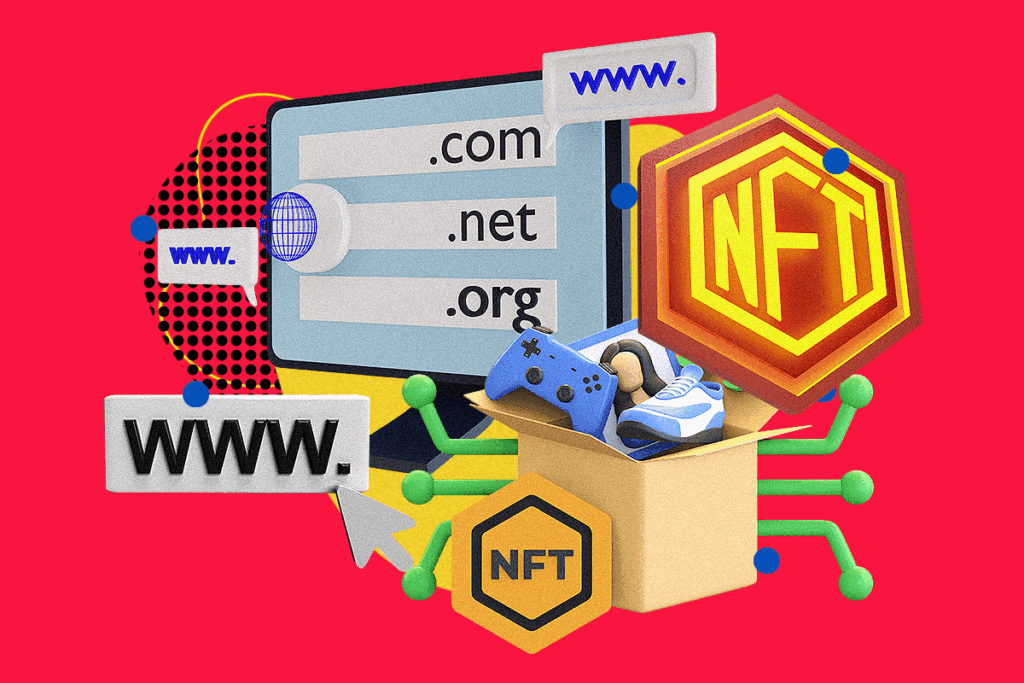What Is an NFT Domain and Why Should You Mint One?
If Web3 is the next version of the internet, then NFT domains are the future of websites. Here’s everything there is to know about Web3 domain names.

A major criticism of NFTs is that they look cool but don’t have any inherent utility. While this can be true of some NFTs, a blanket statement implying they all lack practical value couldn’t be further from the truth. In fact, some NFTs are more functional than they are aesthetic, and this is the main thing separating NFT domain names from most generative art and metaverse NFTs.
NFT domain names function as blockchain usernames that connect to your crypto wallet. NFT domains are essential to building a Web3 identity since they help determine who owns what on the blockchain and make it easier to send and receive cryptocurrencies. NFT domains can also be used as metaverse usernames, like in Decentraland. Here’s a rundown of what NFT domains are, how they work, and why you should get a Web3 domain name before the best ones are gone.
What are NFT domains?
NFT domains are used to simplify hexadecimal crypto addresses into readable Web3 usernames and to create decentralized websites. Web3 domain names are just like traditional top-level domains (TLD) ending in .com, except they use suffixes like .crypto and .eth. Another way NFT domains are different is that they can be traded as tokens on the blockchain. Web3 domains make it easier to remember and identify crypto wallet addresses.
Decentralized websites
NFT domain names can also be used as URLs for decentralized HTML webpages.
Just like how people bought and sold DNS domains in the early days of the internet, people are profiting from buying and selling desirable NFT domain names.
These decentralized websites are hosted by a peer-to-peer data storage network called the InterPlanetary File System (IPFS). They’re static HTML webpages, so they’re basic, but decentralized Web3 websites are censorship-resistant because they aren’t hosted by centralized servers that could get compromised.
How to get a Web3 domain name
Getting a decentralized Web3 domain name is easy and may not even require having crypto or a DeFi wallet. However, before deciding on a domain name, you should check that the one you want is available to mint or purchase. The price of an NFT domain is mostly determined by the character lengths of the domain name and TLD—which is a suffix like .nft or .wallet. Shorter character length domains are usually more expensive since brevity is coveted in the world of domain names.
Where to get a Web3 or NFT domain name
You can get a decentralized Web3 domain name through Unstoppable Domains or by using the Ethereum Name Service (ENS). Here’s how those two options compare.
| Ethereum Name Service | Unstoppable Domains | |
| Custodial | No | Yes |
| Registration | Annual | Forever |
| Supported blockchains | Ethereum | Ethereum, Polygon, & Zilliqa |
| Top-level domains | .eth | .crypto, .nft, .wallet, .dao, .coin, .bitcoin, .dao, .zil, .blockchain, .x, & .888 |
| Pricing | Annual & character length-based | Character length & TLD based |
Unstoppable Domains
One of the most popular places for minting NFT domains is Unstoppable Domains. Unstoppable Domains is supported on the Ethereum, Polygon, and Zilliqa blockchains, but the platform only covers transaction fees on Polygon. This means you can mint, buy, and manage Unstoppable domains on Polygon without paying any blockchain gas fees. The main benefit of Unstoppable Domains is that they’re minted permanently as NFTs so you’ll never need to register or renew them like you do Web2 domains.
The cool thing about NFT domains is that they can be bought, sold, and traded just like any other NFT. This means you can list Web3 domain names on NFT marketplaces like Opensea or create a shop where you profit by flipping or renting out your NFT domains. Unstoppable domains can be resolved to any crypto wallet address on networks like Bitcoin, Ethereum, Litecoin, Ripple, Binance Chain, and Zilliqa—even if they’re not necessarily your addresses.
Using Unstoppable Domains is extremely convenient because you can pay to mint NFT domains using either fiat or cryptocurrency. This makes minting Unstoppable NFT domains super easy and accessible since they cost as little as $10 and can be purchased either with a credit card or in stablecoins or crypto. Also, all Unstoppable Domains accounts come with a custodial wallet so that anyone can own NFT domains regardless of whether they have or even know how to use a Web3 wallet.
Ethereum Name Service
Another method you can use to mint NFT domains is using the Ethereum Name Service (ENS) protocol. ENS is a decentralized application (dApp) for minting Web3 domain names ending in the .eth TLD. ENS domains are different than Unstoppable domains in a number of ways. First, ENS is a completely decentralized protocol governed by the ENS decentralized autonomous organization (DAO). This means you must have a non-custodial Ethereum address to own and use ENS domains.
Another thing to consider is that ENS domains are registered for a finite number of years, so you don’t own them forever like you would Unstoppable Domains and other NFTs. This means the cost of owning an ENS domain is based on the number of years it’s registered, with the minimum being one year. In addition to registration fees, minting an ENS domain requires a gas fee to process the transaction—which can get expensive at times when the Ethereum network is busy.
The functionality of ENS domains is seemingly more limited than Unstoppable Domains. For instance, ENS domains can only resolve to Ethereum, Bitcoin, Litecoin, and Dogecoin addresses, which is fewer than Unstoppable Domain supports. While domains from either platform can be used to create decentralized websites, only Unstoppable Domains be used as decentralized social profiles, as well. The only thing ENS offers that Unstoppable Domains doesn’t is the .eth TLD.
Trading NFT domains
NFT domains are just like other NFTs in that they can be a lucrative trading opportunity. People bought and sold DNS domains in the early days of the internet, but are now profiting from flipping desirable NFT domain names. For instance, if you minted a desirable Web3 domain name like brian.eth, someone named Brian might be willing to purchase it for a premium. The market for short memorable NFT domain names is growing rapidly and their perceived value is creating a rush for the best Web3 domains.
Another way to make money from NFT domains is by renting them out to someone who might use them as their wallet address or a link to a decentralized website. ENS domains have a feature called subdomains which allows you to register a prefix to your existing domain in order to make new domains. These subdomains can have different IPFS websites and wallet addresses set in their records, which allows owners to extract the most value out of their ENS domain. Subdomains are great since they enable you to rent your domain to more people.
How to create a Web3 website
Creating a decentralized website using an NFT domain is relatively simple given some basic code. First, you’ll need to design an HTML webpage—this is the basic coding language most webpages use. Next, once you have a webpage design, you’ll have to upload it as an HTML file to the IPFS network using a platform like Pinata.
Once the HTML file has finished uploading to IPFS, then you can take the content identifier (CID) hash and upload it to the content records of your NFT domain. Finally, your Web3 domain name will resolve to your custom webpage once the content records have finished publishing to the blockchain.
